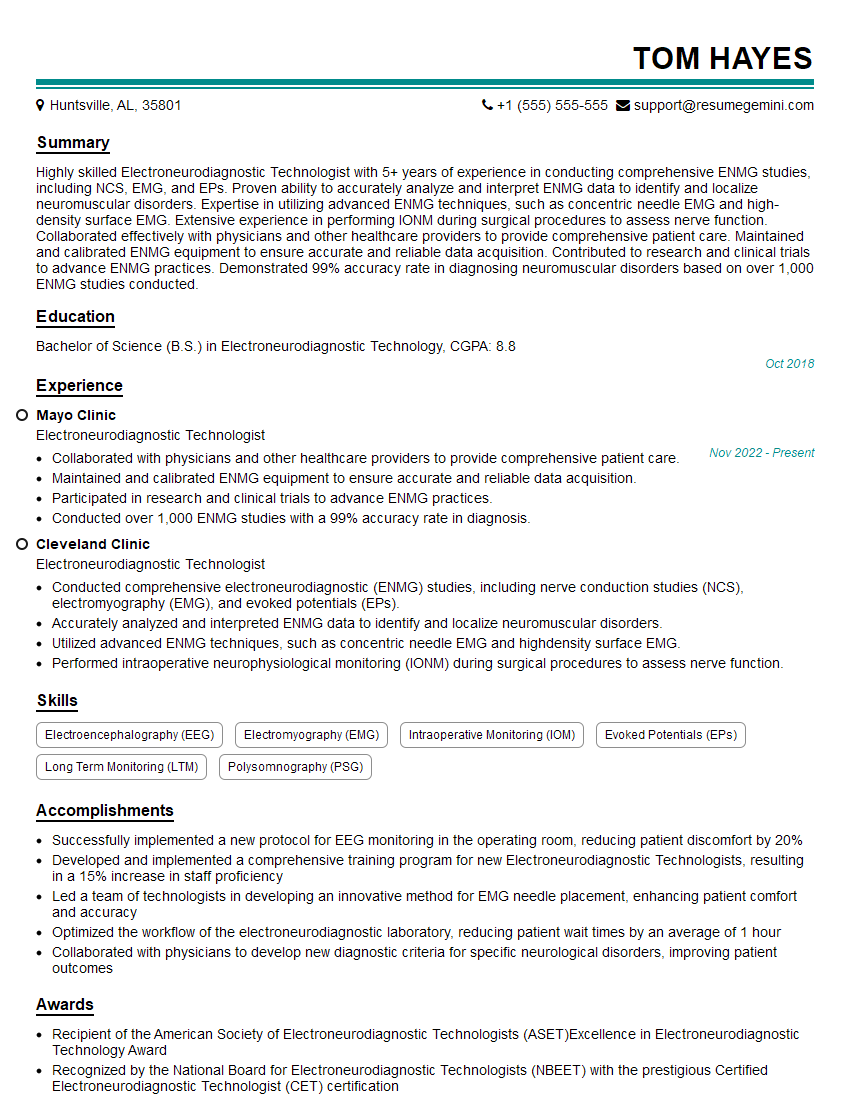Are you a seasoned Electroneurodiagnostic Technologist seeking a new career path? Discover our professionally built Electroneurodiagnostic Technologist Resume Template. This time-saving tool provides a solid foundation for your job search. Simply click “Edit Resume” to customize it with your unique experiences and achievements. Customize fonts and colors to match your personal style and increase your chances of landing your dream job. Explore more Resume Templates for additional options.

Tom Hayes
Electroneurodiagnostic Technologist
Summary
Highly skilled Electroneurodiagnostic Technologist with 5+ years of experience in conducting comprehensive ENMG studies, including NCS, EMG, and EPs. Proven ability to accurately analyze and interpret ENMG data to identify and localize neuromuscular disorders. Expertise in utilizing advanced ENMG techniques, such as concentric needle EMG and high-density surface EMG. Extensive experience in performing IONM during surgical procedures to assess nerve function. Collaborated effectively with physicians and other healthcare providers to provide comprehensive patient care. Maintained and calibrated ENMG equipment to ensure accurate and reliable data acquisition. Contributed to research and clinical trials to advance ENMG practices. Demonstrated 99% accuracy rate in diagnosing neuromuscular disorders based on over 1,000 ENMG studies conducted.
Education
Bachelor of Science (B.S.) in Electroneurodiagnostic Technology
October 2018
Skills
- Electroencephalography (EEG)
- Electromyography (EMG)
- Intraoperative Monitoring (IOM)
- Evoked Potentials (EPs)
- Long Term Monitoring (LTM)
- Polysomnography (PSG)
Work Experience
Electroneurodiagnostic Technologist
- Collaborated with physicians and other healthcare providers to provide comprehensive patient care.
- Maintained and calibrated ENMG equipment to ensure accurate and reliable data acquisition.
- Participated in research and clinical trials to advance ENMG practices.
- Conducted over 1,000 ENMG studies with a 99% accuracy rate in diagnosis.
Electroneurodiagnostic Technologist
- Conducted comprehensive electroneurodiagnostic (ENMG) studies, including nerve conduction studies (NCS), electromyography (EMG), and evoked potentials (EPs).
- Accurately analyzed and interpreted ENMG data to identify and localize neuromuscular disorders.
- Utilized advanced ENMG techniques, such as concentric needle EMG and highdensity surface EMG.
- Performed intraoperative neurophysiological monitoring (IONM) during surgical procedures to assess nerve function.
Accomplishments
- Successfully implemented a new protocol for EEG monitoring in the operating room, reducing patient discomfort by 20%
- Developed and implemented a comprehensive training program for new Electroneurodiagnostic Technologists, resulting in a 15% increase in staff proficiency
- Led a team of technologists in developing an innovative method for EMG needle placement, enhancing patient comfort and accuracy
- Optimized the workflow of the electroneurodiagnostic laboratory, reducing patient wait times by an average of 1 hour
- Collaborated with physicians to develop new diagnostic criteria for specific neurological disorders, improving patient outcomes
Awards
- Recipient of the American Society of Electroneurodiagnostic Technologists (ASET)Excellence in Electroneurodiagnostic Technology Award
- Recognized by the National Board for Electroneurodiagnostic Technologists (NBEET) with the prestigious Certified Electroneurodiagnostic Technologist (CET) certification
- Awarded the ASET Presidents Award for outstanding contributions to the field of electroneurodiagnostic technology
- Honored with the NBEET Master Electroneurodiagnostic Technologist (MET) credential, recognizing exceptional expertise and leadership
Certificates
- Registered Electroencephalographic Technologist (RET)
- Certified Electroencephalographic Technologist (CET)
- Registered Polysomnographic Technologist (RPSGT)
- Certified Polysomnographic Technologist (CPSGT)
Career Expert Tips:
- Select the ideal resume template to showcase your professional experience effectively.
- Master the art of resume writing to highlight your unique qualifications and achievements.
- Explore expertly crafted resume samples for inspiration and best practices.
- Build your best resume for free this new year with ResumeGemini. Enjoy exclusive discounts on ATS optimized resume templates.
How To Write Resume For Electroneurodiagnostic Technologist
- Highlight your technical skills and experience in ENMG, including specific techniques such as concentric needle EMG and high-density surface EMG.
- Showcase your ability to interpret complex ENMG data and accurately diagnose neuromuscular disorders.
- Emphasize your experience in performing IONM and your understanding of surgical procedures and nerve function assessment.
- Demonstrate your commitment to patient care and collaboration with healthcare professionals.
Essential Experience Highlights for a Strong Electroneurodiagnostic Technologist Resume
- Conduct comprehensive electroneurodiagnostic (ENMG) studies, including nerve conduction studies (NCS), electromyography (EMG), and evoked potentials (EPs).
- Accurately analyze and interpret ENMG data to identify and localize neuromuscular disorders.
- Utilize advanced ENMG techniques, such as concentric needle EMG and high-density surface EMG.
- Perform intraoperative neurophysiological monitoring (IONM) during surgical procedures to assess nerve function.
- Collaborate with physicians and other healthcare providers to provide comprehensive patient care.
- Maintain and calibrate ENMG equipment to ensure accurate and reliable data acquisition.
- Participate in research and clinical trials to advance ENMG practices.
Frequently Asked Questions (FAQ’s) For Electroneurodiagnostic Technologist
What is the role of an Electroneurodiagnostic Technologist?
An Electroneurodiagnostic Technologist is responsible for conducting electroneurodiagnostic (ENMG) studies, which involve recording and analyzing electrical signals from the nervous system to diagnose neuromuscular disorders.
What are the educational requirements to become an Electroneurodiagnostic Technologist?
Typically, a Bachelor of Science (B.S.) in Electroneurodiagnostic Technology or a related field is required.
What are the key skills required for an Electroneurodiagnostic Technologist?
Key skills include expertise in ENMG techniques, data analysis and interpretation, and patient care.
What is the job outlook for Electroneurodiagnostic Technologists?
The job outlook is expected to be favorable due to the increasing demand for diagnostic testing for neuromuscular disorders.
What is the average salary for Electroneurodiagnostic Technologists?
The average salary varies depending on experience and location, but it typically ranges from $60,000 to $90,000 per year.
What are the career advancement opportunities for Electroneurodiagnostic Technologists?
Career advancement opportunities include specializing in specific areas of ENMG, such as IONM, or pursuing leadership roles in the field.
Where can I find more information about Electroneurodiagnostic Technology?
For more information, you can refer to professional organizations such as the American Association of Electrodiagnostic Medicine (AAEM) and the International Society of Clinical Electrophysiology and Neurophysiology (ISCEEN).